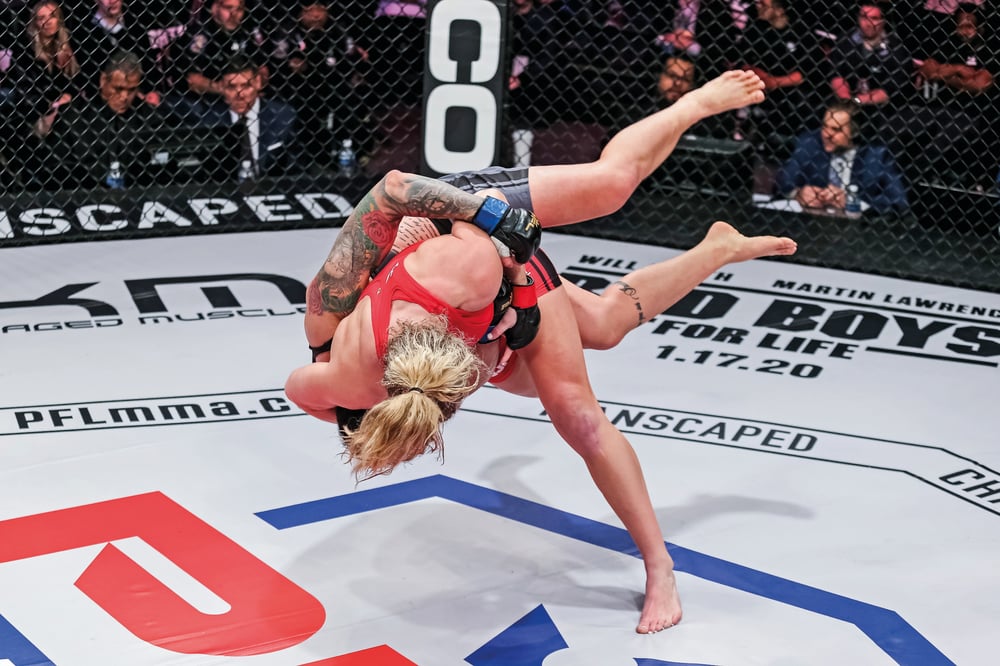
Issue 209
September 2024
E. Spencer Kyte catches up with Kayla Harrison to understand how her loss to Larissa Pacheco became a transformative moment that reshaped her as a fighter and a person, making her more dangerous than ever.
Kayla Harrison losing to Larissa Pacheco was the best thing that could have happened to her and arguably the worst thing for anyone who crossed her path in the future. This wasn’t your ‘sometimes a loss is the best thing for you’ deal. No, this was one of those situations that will only make sense to people who have spent their entire lives chasing greatness for reasons beyond wanting to be great and amass the spoils of victory.
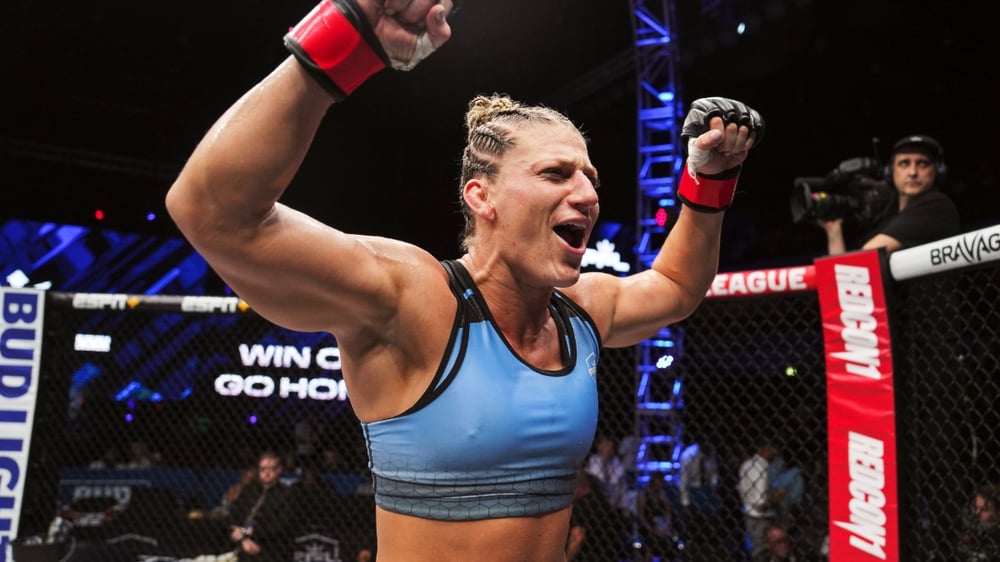
‘IF I DON’T WIN, I WON’T DIE’
Harrison has established herself as a force of nature with her two Olympic gold medals and elite physical talent. But when you grow up afraid of failure, driven by fear rather than passion, reaching those heights doesn’t bring satisfaction; it just ratchets up the pressure. That’s why Harrison was eager to find out how her daughter Kyla was processing her loss to Pacheco after the family got back from their trip to New York City.
“That moment definitely changed my life,” Harrison says, her smile lighting up her face. “That’s why I say a lot of times when I talk about my children and adoption that I truly believe they’re saving me as much as I’m hopefully saving them. They’ve taught me so much in such a short amount of time, and they’ve helped me grow as a person in ways that I never would have been capable of growing on my own.”
Born to Harrison’s sister Aura, Kyla and her brother Emery went to live with their grandmother—Harrison’s mother, Jeannie—soon after they were born. After Jeannie suffered a stroke in 2019 and her husband, Harrison’s stepfather, unexpectedly passed away a year later, the care of the kids was temporarily uncertain, and the two-time Olympic champion was quick to spring into action. She flew home to Ohio, gathered them up, drove back to Florida, and has been building a home with them ever since.
“All relationships — kids, parents, romantic, whatever — they force us to look at ourselves and grow, and it had never occurred to me that someone could love me just for me,” continues Harrison, who is as commanding a presence in an interview setting as she is inside the Octagon. “That probably sounds silly to a lot of people, but I think we live in a world that is very externally driven, and very ‘once I have this, I’ll be happy’ with the house, and this, and this, and keeping up with the Jones’ and more and more and more. It’s almost like we’re afraid to be vulnerable and how we are, so we collect all these external things, and kids cut right through that bulls***. My daughter doesn’t care how many medals I have or how many belts I have. She doesn’t know what’s in my bank account. She doesn’t care. She sees who I am, how I treat her, how I love her and show up for her, and to her, that’s all that matters.
When I realized that, that’s how I started treating myself and how I started treating other people too. I don’t care what you have or who you are; how do you show up?”
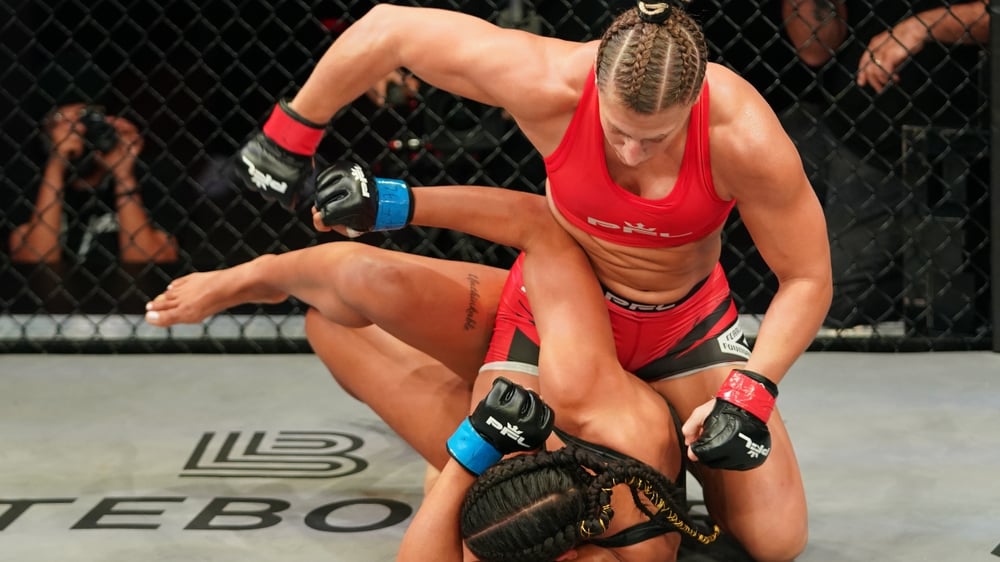
A NEW PERSPECTIVE
As much as Harrison was elated that her coming up short against Pacheco wasn’t some earth-shattering moment for her daughter, coming to grips with the ramifications was challenging. The idea that her losing didn’t change anything was something the 34-year-old UFC contender could not initially understand.
“It’s honestly all been a part of the journey,” begins Harrison. “Who I was five years ago is an entirely different human from who I am today, and everything happened how it needed to happen in order for me to get to this place. It was a very scary concept for me to come to terms with the fact that if I don’t win, I won’t die. It sounds so trivial when I say it now, but really, I lived most of my life living in terror, really — very fear-based, very fear-driven. ‘If I don’t become who I’m supposed to become, I will literally die.’
“I couldn’t even fathom (anything else); it would make me cry to think about it,” continues Harrison, looking skyward and shaking her head, almost as if to wonder how a belief that seems so ridiculous now could have held such a grip on her for so long in the first place. “Through a lot of self-reflection and work. And with the help of a lot of people who are very — I call it awake and aware and present — who are probably a lot further along in their healing journey than I am, and through my kids, again, I was able to come to the realization. And God taught me a lesson that if I do lose, I will not die. And there is hope on the other side, and He’s working all things out for my good, and all is well.”
Harrison laughs, and her mega-watt smile reappears.
“At the end of the day, all is well,” she says. “My daughter is right: they got to have pizza for Thanksgiving, and they got to be in New York City. I had a fight, yeah, but we were all together, and then we got to go home for Christmas.”
Learning that regardless of the outcome of her fight, her kids still loved her the same was a revelatory moment for Harrison that forced her to re-examine the motivations that sent her onto the mats at American Top Team (ATT) every day. After years of believing she had to compete and be the best or else things would all go akimbo, Harrison loves to compete and wants this for herself.
“In the grand scheme of life, it still kind of,” she begins, meandering around her thoughts. “I really want to be a champion. It’s an internal drive that I have. I love to climb the mountain. I enjoy the process. I feel like it refines me, and I’m okay; all is well. Again, I’m a totally different person, and I feel like that makes me a totally different fighter. I am no longer driven by fear, and I really love what I do. I think I’ve done a very good job of surrounding myself with healthy, trustworthy flowers in my garden, so I’m out here living my best life. I’m getting to wake up every day and go beat people up for fun; people that I enjoy being around. I get to home-school my kids. We get to travel. My life is such a beautiful thing, and if you had told me it would be like this when I was at the rock bottom, I would have been like, ‘F*** you! Get away from me.’ But it’s true. I look back on those rock bottoms, and I even have gratitude for them now — that’s the place that I’m at where it’s like who I am was worth every heartache, tragedy, pain. It was worth all of it,” she says with a smile and a nod of confirmation. “Who I have become, the self-love that I have, the love around me that I have, the love that I give, the peace that I have — it was all worth it.”
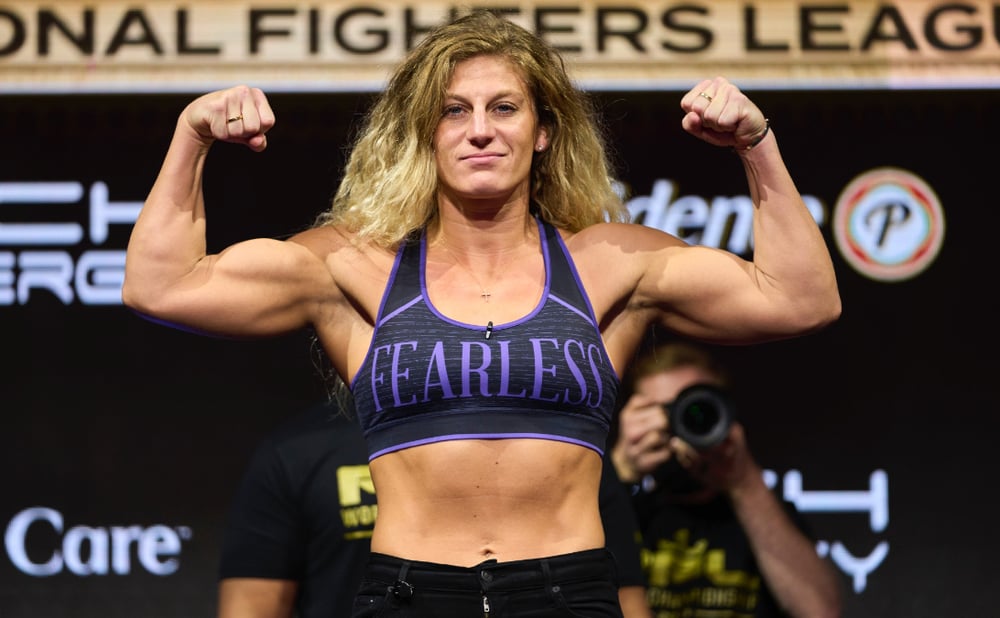
THE SAME, BUT DIFFERENT
Losing to Pacheco changed Harrison’s, but it didn’t change any of the features that make her unique. Her head coach at American Top Team, Mike Brown, knows it's a rare combination of elements that makes her a nightmare to deal with inside the cage.
“It’s a combination of many things, and to be as good as she is, you need all these things, and if you don’t have all these things, you can’t be that good,” says Brown in his usual soft-spoken manner, setting the table for his breakdown of what differentiates Harrison from her competition. “One, she has the genetics. She’s not a normal person; she’s freaky-strong. She has a crazy amount of muscle mass for a female. For some reason, she’s crazy-strong, builds tons of muscle, she’s lean. She doesn’t have to lift that much; just from straight grappling she looks like she does.
“Secondly, it’s starting young. She started judo at a very young age, so when the brain is being wired, the brain is being developed, that foundation (for competing, for working hard) is laid in the brain as you’re growing, so it becomes second nature to you when you start that young.
“And then her work ethic, her work ethic, and her mindset,” he adds. “Those three things all together, when you have all three, it’s an unbeatable package. She’s a rare breed. Even with all of her success and all of her accomplishments, she’s as humble as anyone could on the mat, and I’m sure that’s why she’s in the situation that she’s in, why she’s so good. She always wants to get better, always trying to learn, always trying to improve, and she’s a workhorse — she pushes hard every day. There is no offseason. She fights, she takes a week off, BOOM — back into training, 100 percent every day.”
Though she took a little more time away than normal following the loss to Pacheco, upon returning, Harrison was in a different place mentally, but she was the same driven student.
“The pressure is immense with every fight,” begins Brown, addressing the loss to Pacheco and its after-effects on Harrison. “Every one of them is very important — they all go on your permanent record, they’re all gonna be remembered forever, but being undefeated, having that perfect record holds an extra pressure. I think some of that has come off. You’ve had the loss, and you’re still you. You’re still the same athlete — you’re still the best fighter in the world. You lost, but you had already beaten that fighter two times, so you’re still up in the series,” adds Brown, a former WEC champion who has become one of the best coaches in the sport since hanging up the gloves himself. “It’s a loss on paper, but it was a win when it comes to knowledge, and it’s cliche, but those are the type of fights you learn a lot from, and you know what you really have to work on, and that’s what we did. We went and really focused on some holes and some things we needed to work on, and we’re at a completely different place now than we were then.”
MAKING THE CUT
Harrison has switched promotions and weight classes. When announcing her signing, UFC CEO Dana White announced Harrison’s debut would take place against Holly Holm at UFC 300. Immediately, everyone in the sport wondered whether Harrison, who had stated her opposition to weight cutting in the past, could make the divisional limit, having spent most of her MMA career competing at 155 pounds. Harrison and her team were curious, too, though Brown admits he was a lot less worried about it than his athlete.
“We weren’t certain,” he says when asked about Harrison dropping two divisions. “We thought she could do it, but you need to drop that weight and — if you haven’t been that weight in 20 years, you’re not 100 percent certain that you can make it. You need to do that test cut for your confidence, to make sure you know that you’re in striking range and you can make that weight and still function like you need to. Function at the top of your game, fighting the best fighters in the world.”
They did a test cut and simulated fight, and both went well, which gave Brown confidence
“I was nervous, and I’ve said this in other interviews, but like, I kind of signed on that dotted line, and it was a big leap of faith,” Harrison says when asked about the experience. “I hadn’t weighed 135 pounds since I was 16 years old. (There was) definitely some, I’ll call it ‘trauma,’ related to weight cutting and my past and it being entangled into one thing with my former coach and stuff like that. It was a leap of faith, but I felt really called, and I felt like this was where I was supposed to be. It’s not easy to make 135 pounds,” she adds, chasing her words with a smile and a chuckle. “I’m not gonna beat around the bush. It’s not a walk in the park. It’s 12 weeks of pure — it’s not me that’s making the weight; that’s some other (being). I do not have that kind of strength, that kind of discipline, that kind of self-control, and that kind of willpower. But all fight week, I felt great. I had so much energy. You’re doing a press conference on Thursday when you’re literally not eating or drinking anything, and I’m just like, ‘Holy s*** — LET’S GO!’ I was just filled with so much energy, and it carried me through the weight cut.”
Harrison came in at the divisional limit of 136 pounds, looking shredded and physically imposing, so she put the entire division on notice when she stepped into the Octagon at UFC 300.
A DOMINANT EFFORT, A FEELING OF INEVITABILITY
The final statistics from the UFC 300 fight make Harrison’s level of domination stand out even more, as she out-landed Holm 51-2, completing two takedowns and registering just under five minutes of control time in a bout that lasted six minutes and 47 seconds.
“To be honest, going in, I thought Holly might be the toughest matchup in the weight class, stylistically, just because of her movement, her experience,” offers Brown, reflecting on the fight. “I thought maybe she would poke and run, poke and run, poke and run, and I thought it could be an ugly, boring fight depending on how it went. Maybe she’s hard to get ahold of. You’re not sure until you get in there. But no, she did everything that she trained to do, executed everything that she wanted to execute.”
Like many athletes, Harrison is her own harshest critic, but even she had trouble finding faults in her first effort under the UFC banner.
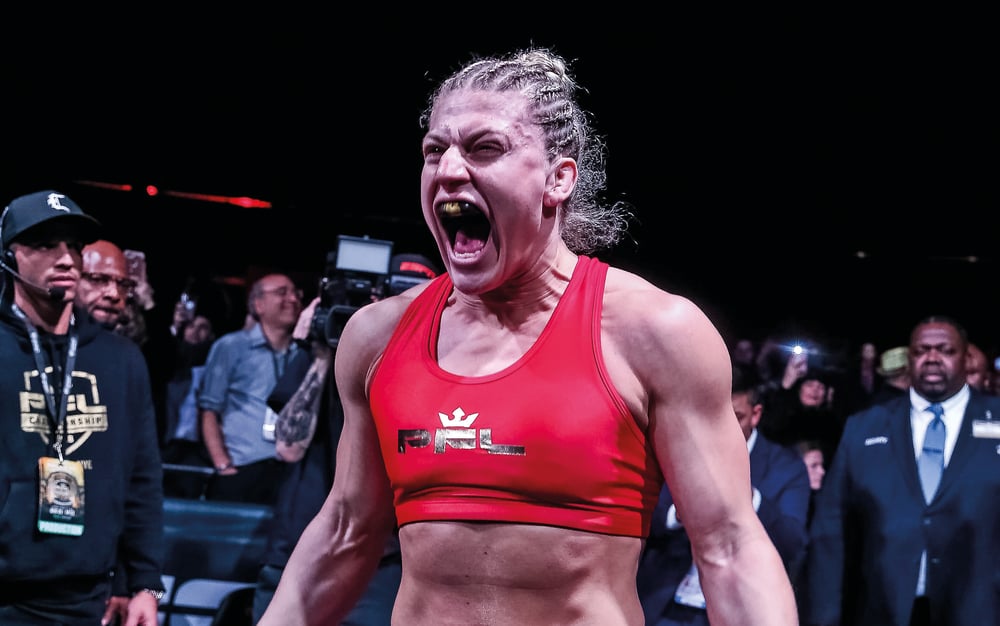
“I try not to read too much into my own press, my own performances, and just keep my nose down, keep working hard,” she begins. “But I was definitely very pleased with my performance. I’m a very hard critic, but this one was kind of hard to find fault in. Of anything, I found fault in how I was after my fight, but other than that, I think it went really good.”
Harrison laughs loud and deep, eventually explaining that she let herself indulge a little more than she would have liked following the win, stating that it will never happen again.
THE NEXT STEPS
The most exciting part of her forthcoming matchup with Vieira at UFC 307 might be that it takes place two fights before Raquel Pennington defends her bantamweight title against former champ Julianna Pena. Having the two fights side-by-side on the main card feels like setting the table for the next bantamweight title fight, and Harrison is happy to do her part to execute the UFC’s plan.
“Keep it warm, honeys!” she says with a chuckle when asked about the positioning of her fight ahead of the bantamweight title bout. “I think that’s what the UFC is doing, is building momentum and building a fight, and I’m happy to play my role, play my part — come in and be the big bad guy, whoop some a**, and make it look easy. I think it’s all part of the plan, and it’s gonna be good.”
Having stormed through Holm and answered questions about her ability to make 135 pounds, Harrison is confident about her place in the pecking order.
“I do truly believe that I’m the best in the world,” she says without hesitation. “Now I have the experience. Now I’m gonna have the experience, the size, the strength, the power — I’m gonna have all the physical advantages, as well as the experience advantage. I really do believe that I am the best female fighter in the world. I’m well-rounded now. I’m comfortable everywhere.”
Though there is unquestionably still work to be done, Brown knows where his athlete stands.
“There is no doubt,” he says quickly when asked if she is the best in the world and a future UFC champion. “There is no doubt that she’s the best on the planet — 135 pounds, 145 pounds, whatever; she’s the best. There is no doubt she’s the best athlete and the best fighter. I think it’s the same thing,” Brown offers when asked about the fight with Vieira. “We’re gonna see the same thing we’ve seen in all the previous fights. The plan doesn’t change. It’s gonna be impose her will on the girl in front of her, put the pressure on, and look for the finish all the time.”
For Brown, that first appearance in the Octagon was all he needed to see the gulf between Harrison and everyone else. While she is currently climbing the divisional ladder in pursuit of a championship opportunity, everyone else has to work to close the gap to contend with the force of nature that has blown into the bantamweight division.
“There were some questions about the weight being at 135,” he says of Harrison’s UFC 300 debut. “That was the first time at ’35. How’s her body gonna react to that? I think it showed that it’s a huge plus and a huge advantage because not only is she better than all these girls, she’s also bigger now. She was tiny at ’55. She didn’t cut. She was walking around 160 (pounds), weighing in at ’55, step in the cage at ’59 or ’60, and some of these girls are cutting 20 pounds. She was a small fighter there, giving up size, but she was just much better than everybody, and now she’s also bigger than you and better than you.”
Brown adjusts his glasses and smiles.
“It’s a big mountain to climb for any female athlete.”
Kayla Harrison's loss may have broken her once, but what she rebuilt in its place is something no opponent will likely be ready for. It’s not just a stronger fighter they’ll face — it’s a woman who has found peace in the fight, and that’s far more dangerous than anything they can train for.
